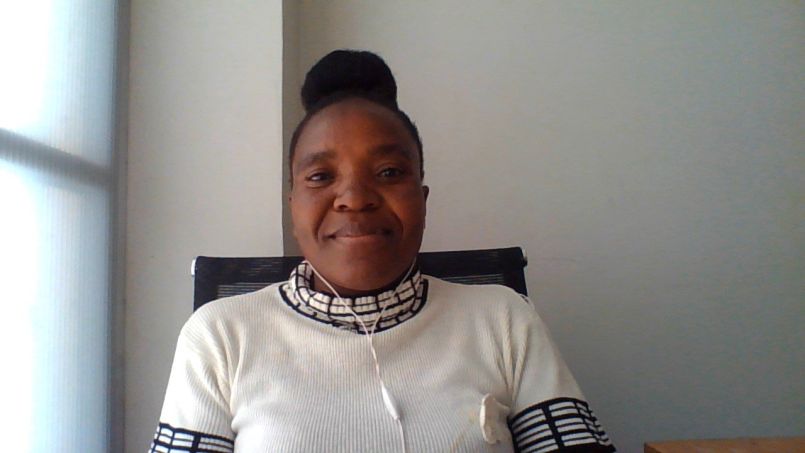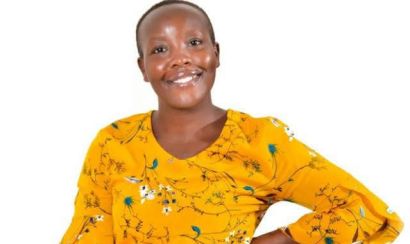Carving a Space for Women in a Male-dominated Field
Pauline Wanjala is a Field Operations Regional Manager in the Upper Western Region of Kenya. She has risen from volunteering in a farmer group 13 years ago to starting her career at One Acre Fund as a field officer. Pauline moved up to be a Field Manager and was later promoted to lead a region and a team of field officers. She talks about her career journey and success in a male-dominated field.

How did you get into One Acre Fund, and how long have you worked here?
I learned about One Acre Fund through my grandmother, a group leader and a pioneer member of the organization. Due to her advanced age, I often volunteered to assist her with her group leader duties. After completing my university education, I learned of an open position at One Acre Fund, applied and interviewed successfully, and joined the organization in 2008 as a field officer.
What was it like when you started? Did you have to acquire any special skills to get into the Field team?
I came into the company backed with the knowledge gained from college, mainly in horticulture. As I immersed myself into the role, I learned that my work would primarily center around communication since the Field team passes knowledge and training to farmers. The One Acre Fund team took me through proper training and guidance on client relations and confidence-building experiences that have helped me gain public speaking, persuasion, time management and leadership skills— all needed to perform well. I also acquired practical farming lessons that have helped me better support our farmers, especially those older in age who require additional assistance— you train them theoretically and then help them implement it in the field.
Like any role, I had to take time to understand my role and its work. I sought advice from those who had been at it for a while and gained hands-on knowledge to build my competence and enable me to do the job well. I am happy that I can now extend the same support to my team so that we can all deliver exceptional work.
What does a typical day look like for you?
I’m an early riser. My days start as early as 5:30 am with some personal time and a good breakfast, preferably a nice hot cup of porridge. At 7 am, I go through my day’s schedule and review my deliverables for the day. I then reach out to my team members and respond to any urgent matters to ensure everyone is set for work, and then head out for fieldwork at 8 am. Most of the sites in my area hold their group leader meetings on Tuesdays, and I always make sure to attend because that is where we discuss work-related challenges. My presence is also the best way to motivate and empower my team. I spend my afternoons doing office work. I work on reports, respond to emails, and align our goals and targets with my team. During my weekly check-ins with my manager, I update her on my team’s progress and workshop solutions to challenges.
Have you faced any challenges as a woman in the field? How have you handled them?
At the start of my career, being a mother, a spouse and an employee all demanded my attention, and juggling everything took a toll on me. I had to take a step back, self-reflect and restrategize. Through proper work planning, I am now able to balance the three. I organize my to-do lists and align them to my work and personal objectives. I ensure to give my work uninterrupted attention during the stipulated hours so that I can wind down with my family in the evening. I have learned to take a break and defer any work that eats into my family time. In case of any urgent work matters, I am comfortable having earlier mornings to complete unfinished business and meet my deadlines.
Secondly, field operations in our organization is a male-dominated space; I manage and work with several men. It is often the case that my work experiences as a woman differ from those of my male colleagues; that shapes our lives differently. For example, homecare duties often fall on women. As a working mother, I must care for my children while also ensuring that my work is not compromised. I am grateful that I have a supportive partner; whenever I have really pressing work, he usually steps in to take care of our family. I often encourage my team to use our (gender) differences to our benefit. By challenging each other, integrating different perceptions, and working in partnership with people who think differently, we have improved our work relationships and pushed for innovative ideas that advance us individually and as a team.
How does One Acre Fund support women in the field? For example, are there any networks or communities set up at the organization that you’ve found helpful?
Yes, there are. I appreciate the organization for setting up the Women Leadership Council (WLC). The WLC provides women with a forum to mentor each other and share their experiences by pairing senior female leadership with emerging managers. It also provides women-specific training on topics like organization, work planning, and communication to reduce barriers facing women in these areas and help them develop their skills and confidence. Since its inception, the Council has empowered many women to rise into leadership positions by fighting against gender bias and running programs to build women’s confidence. By encouraging One Acre Fund women to recognize and utilize their gifts, talents and knowledge to get ahead in their work, we are well on our way to professional gender equity.
What has been your proudest moment at One Acre Fund?
I am experiencing and witnessing the positive impact of the Women Leadership Council on women in One Acre Fund. I appreciate the staff trainings offered by the organization. When it tasks you with a job, the One Acre Fund team provides you with a clear roadmap and the know-how to attain your personal and work goals.
What women do you admire most in a professional/personal capacity?
I look up to the late Professor Wangari Mathai, who challenged people to take care of the environment and dedicated her life to protecting the environment. Through her initiatives like the Green Movement, she gained worldwide recognition and brought about a change in people’s perspectives on environmental responsibility.
Given your experience, what advice would you give to women starting their careers?
Understand your objectives and focus on achieving them. Everyone experiences challenges; don’t let yours put you down. People tend to focus their attention on the obstacles in their way, which prevents them from achieving their goals. I encourage women to be intentional and focused, find solutions to obstacles, and recalibrate when needed. It also pays to ask for help and guidance from colleagues or mentors. Finally, have an open mind to learn and ask for help.
Heels or sneakers?
Sneakers. I am always in the field, and comfort is key.
Tea or coffee?
Neither. I love my porridge.
An indoorsy or outdoorsy type of weekend?
My weekdays are spent in the field, so I prefer to spend my weekend indoors for personal downtime and time with my family.
Suppose you were to have lunch with someone dead or alive. Who would it be and why?
Bill Gates, to learn about his success journey, pick his mind and learn from some of his business lessons.

Check out our job openings!
Ready to make your mark? We're on the lookout for more talented women to join our team. Check out our open vacancies here! View Open Roles



